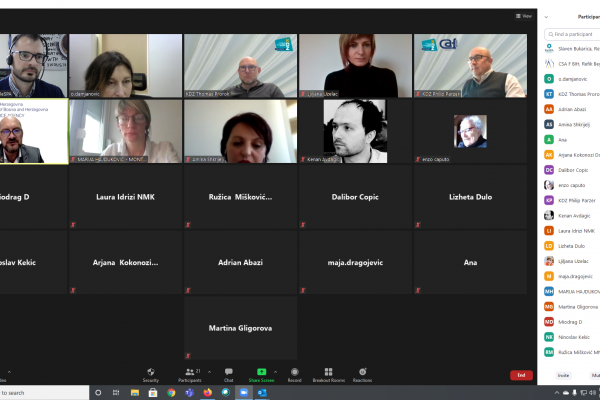
RQMC introduced at the Quality Management Working Group Meeting
At the first QM Working group meeting in 2021, ReSPA presented to the members of the Working group developments on establishing the Regional Quality Management Centre within ReSPA. The opportunity was taken to present the Austrian CAF Centre hosted in KDZ with its main functions and provisions as well as the model from North Macedonia of embedding Quality Management (QM) in the laws and bylaws. The group members from Albania, Bosnia and Herzegovina, Montenegro and Serbia briefly presented the CAF implementation in their countries.
Regional Quality Management Centre (RQMC) has been established with ReSPA Member countries' support as the regional point of expertise in QM. Its main activity is to organize/conduct the CAF External Feedback Procedure (PEF) certification of the "Effective CAF User" Label and award the CAF Effective User Certificate to the interested institutions and organizations in the Region. Besides, the Centre will work on the institutionalization of CAF and the provision of various activities to enhance Quality Management networking in the Region and cooperation in this field amongst the Centre's members.
Therefore, RQMC acts, inter alia, as the CAF Resource Centre by providing capacity building activities aimed at the CAF institutionalization in the Western Balkans (promoting CAF, organizing CAF pilots, Training for trainers, CAF events, etc.). It is expected that in 2021 Centre undertakes the first certification of the "Effective CAF User" Label for public administration institutions that successfully implement quality management using CAF.
ReSPA has developed the Memorandum of Establishment and Operation and "Rules and Procedures governing the organization and operation of the RQMC", which will be accompanied by the PEF Guidelines to formalize all steps needed to be undertaken by the RQMC and institutions from the public administrations and to undergo the process of external CAF evaluation.
The core structure of RQMC consists of two regional networks – CAF Network and PEF Network. These networks will gather the most advanced QM practitioners from the Region and monitor CAF implementation and promote CAF in their respective countries.
Ms Olivera Damjanović, ReSPA Programme Manager, presented the next steps to support two regional networks' work and further institutionalize CAF through CAF pilots and CAF ToT. She emphasized that ReSPA will invest considerable efforts towards the RQM Centre's operationalization to gradually influence the level of performance in the institutions from the Western Balkans public administrations through better performance and consistent quality control and management. That will inevitably lead to the provision of better services to the citizens and businesses.
Besides the RQMC presentation, the Meeting served as an excellent forum to identify the regional needs for the CAF implementation, the present state of play in the PA institutions and views on how to increase capacities in the Region regarding CAF.
Ms Amina Shkrijelj, CAF Correspondent, Ministry of Information Society and Administration in North Macedonia, presented the latest Quality Management developments and their CAF implementation experience. The dynamic approach taken in North Macedonia to institutionalize QM by embedding it in the law is unique in the WB region.
Mr Thomas Prorok, Deputy Managing Director of the KDZ (Centre for Public Administration Research, Austria), presented the KDZ CAF Centre and various services. The central Government of Austria authorizes this Centre to undertake the PEF procedure for the public sector in Austria. Besides, it works continuously on CAF promotion and provides a broad spectrum of CAF training.
Mr Enzo Caputo, a ReSPA Expert, presented the monitoring exercise ReSPA will undertake in June 2021 to examine the influence its actions had in the previous eighteen months in public administrations of Member countries. The comprehensive monitoring findings will serve ReSPA for future planning while raising the level of its support given in the context of public administrations' reforms on their way to the EU.



